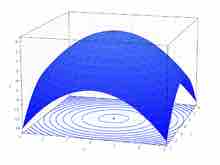Mathematical optimization is the selection of a best element (with regard to some criteria) from some set of available alternatives. Optimization process that involves only a single variable is rather straightforward. After finding out the function
Many design problems can also be expressed as optimization programs. This application is called design optimization. One subset is the engineering optimization, and another recent and growing subset of this field is multidisciplinary design optimization, which, while useful in many problems, has in particular been applied to aerospace engineering problems.
Economics is closely linked to optimization of agents. Modern optimization theory includes traditional optimization theory but also overlaps with game theory and the study of economic equilibria. In microeconomics, the utility maximization problem and its dual problem, the expenditure minimization problem, are economic optimization problems. Insofar as they behave consistently, consumers are assumed to maximize their utility, while firms are usually assumed to maximize their profit. Also, agents are often modeled as being risk-averse, thereby preferring to avoid risk. Asset prices are also modeled using optimization theory, though the underlying mathematics relies on optimizing stochastic processes rather than on static optimization. Trade theory also uses optimization to explain trade patterns between nations. The optimization of market portfolios is an example of multi-objective optimization in economics.
Another field that uses optimization techniques extensively is operations research. Operations research also uses stochastic modeling and simulation to support improved decision-making. Increasingly, operations research uses stochastic programming to model dynamic decisions that adapt to events; such problems can be solved with large-scale optimization and stochastic optimization methods.

Maxima
Finding maxima is useful in optimization problems.